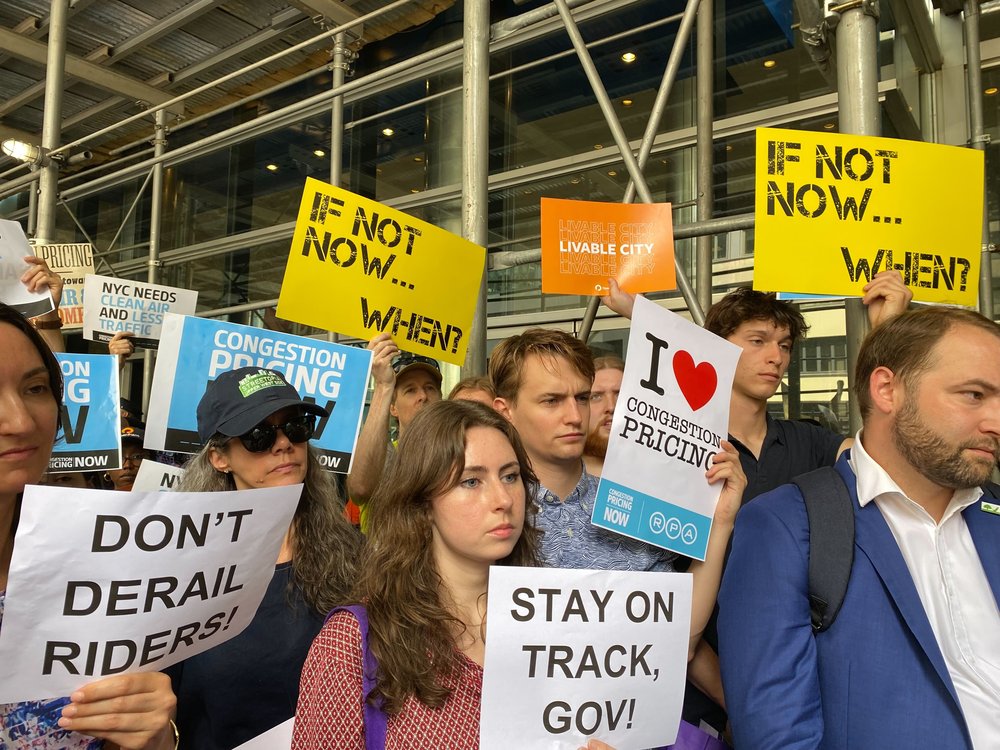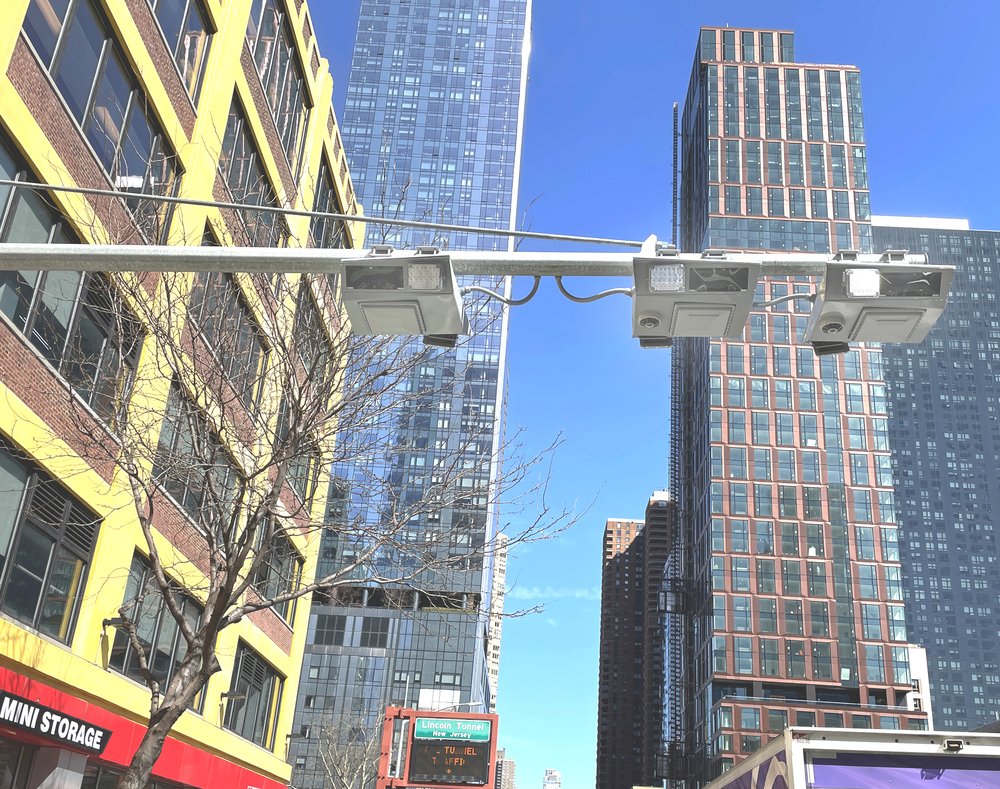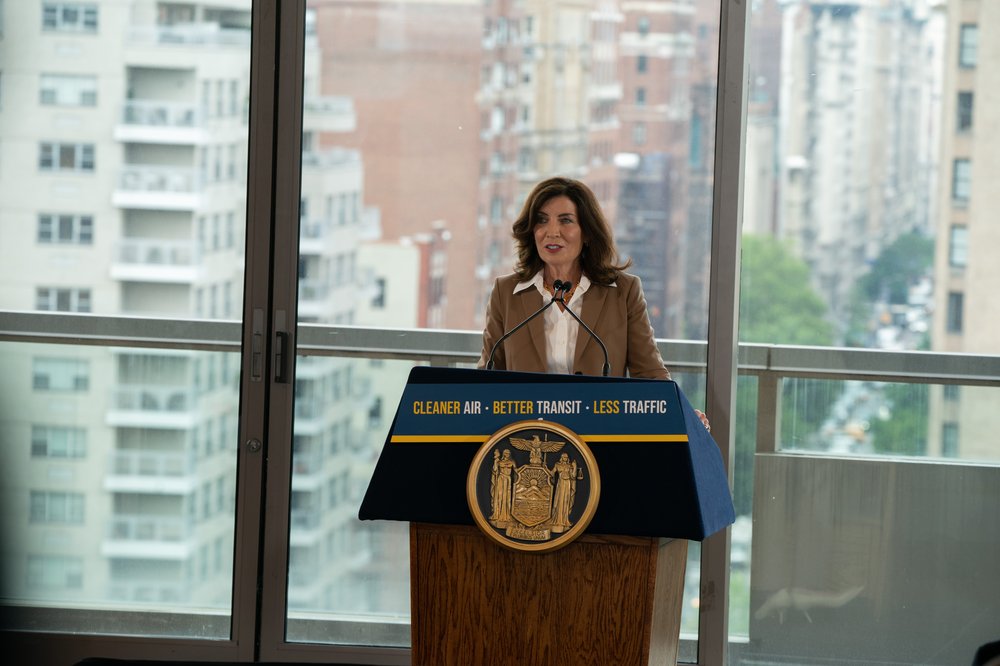Gov. Hochul indefinitely pauses NYC congestion pricing, weeks before tolls were set to launch
June 5, 2024, 9:27 a.m.
The plan to toll drivers in Manhattan south of 60th Street was designed to reduce gridlock and pollution while funding billions worth of mass transit upgrades.

New York Gov. Kathy Hochul is blocking the MTA’s long-awaited plan to toll drivers entering the busiest parts of Manhattan, a last-minute about-face that’s infuriating public transit advocates and spurring accusations of political posturing.
In a six-minute video address on Wednesday, Hochul confirmed she directed the MTA to “indefinitely” pause the congestion pricing program, which would have charged a base toll of $15 for drivers who enter the borough below 60th Street. The program was years in the making and had been set to go into effect on June 30.
“Circumstances have changed and we must respond to the facts on the ground,” Hochul said, pointing to economic concerns including high inflation and post-pandemic vacancy rates in Manhattan office buildings.
Hochul’s decision to pull her support for congestion pricing comes after she publicly backed the plan for months.
The tolls were controversial among some drivers in New York City’s suburbs, a battleground area that could help determine control of the U.S. House of Representatives. State lawmakers are also up for reelection this November.
The indefinite pause on the program also leaves the MTA’s capital plan to upgrade mass transit infrastructure with a major funding hole. The tolls were required by law to generate $1 billion a year, which in turn would be used to finance $15 billion worth of bonds. The MTA planned to use the money to pay for investments such as new subway cars, upgrades to aging track equipment, and the extension of the Second Avenue subway into East Harlem.
In her address, Hochul said the state has set aside money — likely in the New York’s cash reserves — to help bridge the gap. But she also acknowledged her office is currently “exploring other funding sources.”

Four people briefed on Hochul’s plan told Gothamist that the governor is considering a potential increase in the MTA payroll tax for New York City businesses. The officials requested anonymity because they weren’t authorized to speak about private discussions, which are still underway.
A tax hike would require legislative approval in Albany, where lawmakers are scheduled to end their annual session later this week.
“I’m very upset that suddenly out of the blue this would pop up,” said state Sen. Liz Krueger, a Manhattan Democrat who chairs the Senate finance committee.
Last month, former President Donald Trump wrote that he would “terminate” congestion pricing in his first week in office if reelected. Trump said the tolls — which aim to reduce traffic, improve the environment and raise money for public transit — were “a massive business killer.”
At the same time, increasing taxes during an election year can be politically fraught. Krueger noted that the creation of the payroll mobility tax in the late 2000s helped tank the Democrats’ hold on the state Senate in 2010, though they later regained the majority.
Hochul and state lawmakers raised that same tax just last year to plug a budget deficit at the MTA. By only imposing the tax on top-earning city businesses, legislators avoided significant opposition in the politically volatile suburbs.
Politico and the New York Times were first to report that Hochul was considering pushing back the congestion pricing program. Politico reported that Hochul’s move came after pressure from House Minority Leader Hakeem Jeffries, who represents parts of Brooklyn and is focused on regaining a Democratic majority in the House.
In a statement, Jeffries spokesperson Andy Eichar said the Democratic leader remains neutral on congestion pricing but supports a “temporary pause of limited duration to better understand the financial impact on working-class New Yorkers.”
Hochul’s announcement follows her visit on Tuesday to Washington, D.C., where she joined President Joe Biden as he announced an executive order expected to result in temporary closures of the U.S. southern border.

Rockland County Assemblymember Ken Zebrowski said he was briefed on Hochul's plan to stop congestion pricing but said lawmakers still need to figure out how to replace the money from the tolls. "I have been a longtime opponent of congestion pricing but recognize that the capital plan will need alternative funding to maintain the system," he said.
Hochul, a Democrat, had been a vocal proponent of charging drivers a fee in part of Manhattan and touted it as a progressive environmental policy. During a rally in December, she called the tolling scheme "transformative" and said it would give the state "the resources to invest in our [subway] system, a 110-year-old system, so it's positioned for the next 110 years."
Hochul was set to tout the plan at an economic summit in Ireland two weeks ago, according toprepared remarks distributed by her office. But when that section of the speech came up, Hochul skipped the lines about supporting congestion pricing.
“It took a long time because people feared backlash from drivers set in their ways,” Hochul was set to say. “But … if we’re serious about making cities more livable, we must get over that.”
The state Legislature is scheduled to leave Albany for the year on Thursday, though the session is expected to be extended into Friday, at least in the Assembly.
The MTA has already installed high-tech cameras and E-ZPass readers throughout Manhattan to collect the tolls. In 2019, the agency approved a $507 million contract with a contractor to put up the equipment.
More than 700,000 vehicles enter the tolling zone in Manhattan every day, according to transit officials. The MTA has argued that 85% of the people in the zone get there by mass transit, not car. The money generated from congestion pricing would be used to improve their commutes.
The tolling plan has wide support among transit advocates, who see it as the realization of a goal dating back to Mayor John Lindsay’s administration in the 1960s and 1970s.
They anticipate that reduced traffic would lead to faster buses and fewer pedestrian traffic deaths. Advocates have said that if the program is successful, it could be a model for other major cities around the country that are struggling with gridlock and pollution.
"New York City public transit riders gave Gov. Hochul her margin of victory in the 2022 election," Betsy Plum, executive director of the Riders Alliance, wrote in a statement. "Stopping congestion pricing before it even starts would be an outrageous betrayal of our trust. Congestion pricing is the only public policy that can make our subway more reliable and accessible, speed up slow bus service, and help clear the air as wildfire smoke thickens."
"Gov. Hochul must turn it on June 30 as planned," Plum added.
Still, the tolls have proved to be a political headache in competitive congressional districts in the Hudson Valley, on Long Island and in New Jersey. All U.S. House seats are on the ballot this year.
Opponents of the congestion pricing plan — including New Jersey Gov. Phil Murphy, the city teacher’s union and a group representing truck drivers — have sued to halt or delay the tolling program. Federal judges in Manhattan and New Jersey are set to rule in those cases.
This story was updated to include additional details from Gov. Kathy Hochul’s announcement and remarks from state lawmakers.
Correction: A previous version of this story included a quote from Gov. Kathy Hochul that was in her prepared remarks, but she did not say at an event in Ireland.
MTA plans to turn on congestion pricing tolls June 30